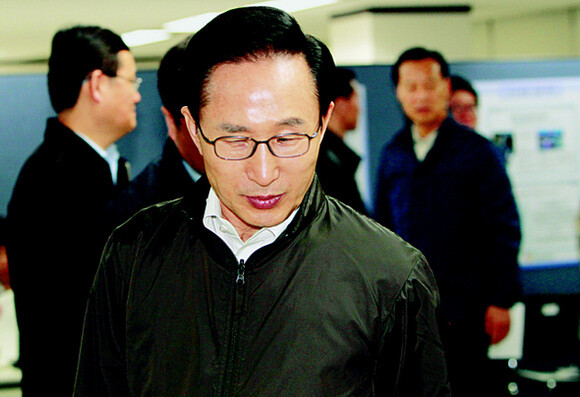hankyoreh
Links to other country sites 다른 나라 사이트 링크
How long the President can keep quiet on illegal surveillance?

By Ahn Chang-hyun, Blue House correspondent
With confirmation that the Prime Minister‘s Office carried out large-scale illegal surveillance of civilians, the major question now is whether President Lee Myung-bak knew about it. The case takes on a different nature if it turns out that the president was directly involved.
Evidence from throughout the surveillance process raised doubts about whether Lee was unaware that the monitoring was taking place.
Major focuses of the Blue House are reflected in the details of the surveillance by the Prime Minister’s Office‘s public ethics division. In 2009, it focused on following television network activities and gauged the loyalty of current and former police leaders in terms of “embodiment of the governance philosophy.” For the Lee administration, control of the media and the loyalty of the police have been urgent concerns since it suffered the sting of the candlelight vigils against imports of US beef. If he received any reports on surveillance reports, it would mean he was aware that illegal monitoring was taking place.
Another issue is Lee’s approach to his duties. As befits a former corporate CEO, he is known to have run the Blue House with a “keep quiet and get the job done” mentality rather than an official system. Sources report that he does not communicate with the senior secretaries in the Blue House and has received direct reports from secretaries on a number of occasions. In particular, he is said to have often had private consultations with secretaries he was particularly fond of.
A former Blue House official said, “The president once responded to someone who said they needed to quit doing their previous work after being promoted by saying, ‘Don’t worry about the title. Just keep doing the same thing in the new position.’”
The Blue House’s approach is also contributing to suspicions. It has been silent to opposition demands that it order a thorough prosecutors investigation. It has also done nothing about the fact that Justice Minister Kwon Jae-jin, who was senior secretary to the president for civil affairs at the time of the prosecutors‘ initial investigation in 2010, is in a position that would allow him to have an influence on the new investigation. Already, prosecutors are known to have determined that the public ethics division drafted a separate “direct report” besides its report to the office of the senior secretary for civil affairs.
Many observers are saying that President Lee will be unable to continue avoiding the case and will have to state his position in some form or another. The argument is that the allegations will not go away until he himself clears things up.
But the Blue House is showing no signs of any intentions of doing so. Even after the opposition brought up the topic of his possible resignation, the Blue House did not give its usual official response.
A senior official there dismissed the allegations, asking, “How could a regular secretary report to the president when he can’t even make time for senior secretaries?”
The same official also said, “There are no plans for an apology from President Lee.”
Please direct questions or comments to [englishhani@hani.co.kr]
Editorial・opinion
![[Guest essay] The real reason Korea’s new right wants to dub Rhee a founding father [Guest essay] The real reason Korea’s new right wants to dub Rhee a founding father](https://flexible.img.hani.co.kr/flexible/normal/500/300/imgdb/original/2024/0423/8317138574257878.jpg) [Guest essay] The real reason Korea’s new right wants to dub Rhee a founding father
[Guest essay] The real reason Korea’s new right wants to dub Rhee a founding father![[Column] ‘Choson’: Is it time we start referring to N. Korea in its own terms? [Column] ‘Choson’: Is it time we start referring to N. Korea in its own terms?](https://flexible.img.hani.co.kr/flexible/normal/500/300/imgdb/original/2024/0423/3617138579390322.jpg) [Column] ‘Choson’: Is it time we start referring to N. Korea in its own terms?
[Column] ‘Choson’: Is it time we start referring to N. Korea in its own terms?- [Editorial] Japan’s rewriting of history with Korea has gone too far
- [Column] The president’s questionable capacity for dialogue
- [Column] Are chaebol firms just pizza pies for families to divvy up as they please?
- [Column] Has Korea, too, crossed the Rubicon on China?
- [Correspondent’s column] In Japan’s alliance with US, echoes of its past alliances with UK
- [Editorial] Does Yoon think the Korean public is wrong?
- [Editorial] As it bolsters its alliance with US, Japan must be accountable for past
- [Guest essay] Amending the Constitution is Yoon’s key to leaving office in public’s good graces
Most viewed articles
- 1[Guest essay] The real reason Korea’s new right wants to dub Rhee a founding father
- 2[Column] ‘Choson’: Is it time we start referring to N. Korea in its own terms?
- 3Why Korea shouldn’t welcome Japan’s newly beefed up defense cooperation with US
- 4Senior doctors cut hours, prepare to resign as government refuses to scrap medical reform plan
- 5Terry Anderson, AP reporter who informed world of massacre in Gwangju, dies at 76
- 6New AI-based translation tools make their way into everyday life in Korea
- 7[Column] The clock is ticking for Korea’s first lady
- 8Opposition calls Yoon’s chief of staff appointment a ‘slap in the face’
- 9[Column] The president’s questionable capacity for dialogue
- 10Korean government’s compromise plan for medical reform swiftly rejected by doctors